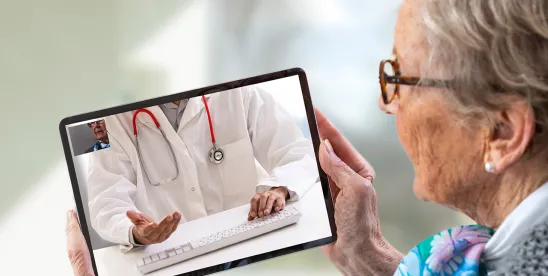Trending in the past week:
-
Interstate Compacts
-
Medicaid Reimbursement
-
Prescribing
-
Health Practitioner Licensing
-
Behavioral Health
A CLOSER LOOK
Finalized Legislation & Rulemaking:
It was a relatively slow week for finalized legislation and rulemaking, with the exception of significant activity in Utah:
-
House Bill 159 (HB 159) provides that healthcare practitioners who are licensed outside of Utah may temporarily provide telemedicine services to individuals within the state of Utah if such practitioners receive a temporary telemedicine license. Utah will issue a temporary telemedicine license if a healthcare practitioner completes an application for license by endorsement from the applicable licensing agency and the agency determines that it will not be able to process the application within 15 days after submission.
-
Senate Bill 269 (SB 269) requires the Utah Department of Health and Human Services to apply for a Medicaid waiver and, if the waiver is approved, contract with a single entity to provide coordinated care through certain virtual and electronic services, including telemedicine, video-consults and in-home biometric monitoring, for qualified individuals with certain chronic conditions.
-
House Bill 166 (HB 166) allows for the provision of remote mental health therapy or substance use disorder counseling to Utah patients subject to certain conditions, including but not limited to:
-
The practitioner may not prescribe drugs unless she obtains a license in Utah to do so.
-
The practitioner must know how to access emergency services and resources in Utah, and must be aware of applicable laws and rules regarding required or permitted reporting or disclosure of confidential client communications.
-
The practitioner must notify the Utah Department of Health and Human Services that she is providing such remote services within one day of providing the services.
-
The practitioner must obtain a Utah license within nine months after the day on which she first provides the services remotely in Utah, or if she provides the services remotely to more than one client in Utah.
-
-
House Bill 152 (HB 152) repealed certain sections of law to clarify that healthcare professionals offering telemedicine services may not diagnose a patient, provide treatment or prescribe a drug based solely on an online questionnaire, an email message or a patient-generated medical history.
Legislation & Rulemaking Activity in Proposal Phase
Highlights:
-
In Montana, a proposed bill (SB 155) would enact the Occupational Therapy Licensure Compact. The compact would ease licensing requirements for occupational therapists providing telehealth services in Montana and facilitate interstate exchanges of licensure and disciplinary information regarding providers between the states that join the compact.
-
In Arizona, a proposed bill (SB 1457) would permit licensed psychologists to prescribe US Food and Drug Administration-approved psychotropic medications by obtaining a “prescription certificate” from the Arizona Board of Psychologist Examiners. Under the proposed bill, licensed psychologists would first need to obtain a “conditional prescription certificate” to prescribe psychotropic medications under the supervision of a licensed physician in-person, by phone or via video conference. A licensed psychologist may then pursue full prescribing authority under a “prescription certificate” by satisfying the proposed requirements, including the following:
-
Completing a practicum of at least 80 hours in clinical assessment and pathophysiology under physician supervision
-
Completing an additional practicum of at least 400 hours treating at least 100 patients with mental disorders under physician supervision
-
Receiving a determination from the Arizona Board of Psychologist Examiners, Arizona Medical Board, and Arizona Board of Osteopathic Examiners in Medicine and Surgery that the psychologist has been sufficiently trained to treat a diverse patient population to prescribe without further supervision.
-
-
In Georgia, a House Bill (HB 203) that passed both chambers would clarify that in addition to telemedicine, artificial intelligence and related applications may be used to perform an “eye assessment” to facilitate the process of fitting and dispensing eyeglasses and contact lenses. The proposed bill states that a healthcare professional must still provide a fulsome eye examination, either in-person or via synchronous audio-visual telemedicine services, to issue a prescription for eyeglasses or contact lenses.
-
Kentucky proposed a bill (SB 47) that would permit practitioners to prescribe medicinal cannabis via telehealth consultations, as long as the practitioner-patient relationship was first established via an in-person examination.
Why it matters:
-
States facilitate interstate coordination of care by easing licensure burdens. States continue to broaden the opportunities for out-of-state providers to provide telehealth services to patients in the state, such as in Montana and in Utah. These efforts demonstrate how states are attempting to modernize and facilitate access to care by reducing licensure burdens.
-
Specialized areas of medicine may allow for faster technologic innovation. Georgia’s bill, which would allow practitioners to incorporate artificial intelligence as an adjunct to more traditional examinations, indicates that specialized areas of medicine may be quicker to adopt innovative technologies to facilitate the provision of efficient services.
-
States clarify that virtual care technologies do not substitute in-person healthcare requirements. The bills in Georgia and Kentucky that permit treating and interacting with patients via new electronic methods demonstrate that although states are normalizing the provision of healthcare services through virtual services, many states still require providers to establish a provider-patient relationship in person prior to treating or interacting with patients virtually.






 />i
/>i
